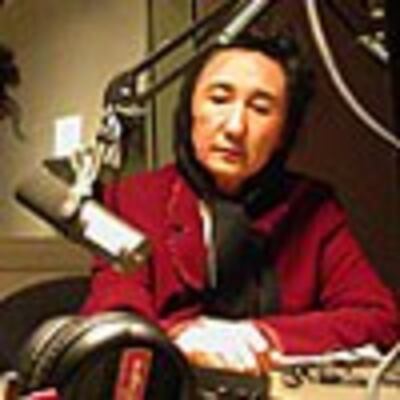
WASHINGTON—RFA's diplomatic correspondent in Washington, Arin Basu, interviewed Rebiya Kadeer on March 28 through her U.S.-based daughter, Akide Rouzi:
RFA: Tell me about the Thousand Mothers Movement, which you founded.
Kadeer: I witnessed first-hand that Uyghur women were uneducated and dependent upon their sons, and their husbands. Educated women were very rare. There weren't many of them. And through my experience in business, I learned a lot more. They didn't know what was going on in society; their lives were very circumscribed. Through my experience with my business, I learned a lot more. And I wanted to teach Uyghur women to stand on their own two feet and take care of themselves and be independent. That way, they could learn a lot more than they could by locking themselves up at home. I learned that for a nation to move forward, its mothers must go forward as well.
I swore to myself that I would save women, mothers, from the same fate that came to me... I kept my word. I fought for 30 years after that.
RFA: You are, were, a successful businesswoman. You are a Uyghur woman who dealt with the same social situation, the same oppression, that other Uyghur women are now suffering from. Where did you find the courage to swim against the tide? Where did you get your courage to do that?
Kadeer: I had two marriages. During my first marriage, I was just like the majority of Uyghur women. I stayed home, cooked, took care of my kids, and depended on my husband to bring money home. I was just a wife, and mother to six children.
Then, I noticed that my husband wasn't bringing enough money into the house, and the family was kind of suffering for lack of money. So I was quietly doing a little business on the side. I was making clothing, I was distributing it and selling little things that I stitched, little things I made. And then I was discovered by the Chinese authorities.
'Many women follow in my footsteps'
So the Chinese government, the Chinese local officials, told my husband-my ex-husband-to divorce me. They put pressure on him to divorce me because they accused me of secretly doing business. They said that it was wrong for me to do secret business. So they pressured my ex-husband to divorce me. So my ex-husband was forced to divorce me at the time.
Then I realized that Uyghur women had to wake up, they had to take action against this. When I was divorcing him at the court, I swore to myself that I would save women, mothers, from the same fate that came to me... I kept my word. I fought for 30 years after that.
RFA: There are women across Asia who face some of the same problems that Uyghur women do: poverty, dependency on men, a lack of [legal] rights. What larger lesson would you like women in all oppressed societies to learn from your life, your experience, your successes, and your dark days?

Kadeer: Many women in my country have learned many, many lessons. I set an example, and many women follow in my footsteps. And now I want to write books-to write down what happened to me-and also what I did for Uyghur rights and women's rights. And I will help other women and others in the world to understand that and that they need to take a step forward.
RFA: Men are an integral part. Do you plan to involve men, so that they understand the importance of empowering women?
Kadeer: Men and women, at the same time, should learn the same lessons. When men and women go hand in hand and fight together for the same future, then we can all accomplish something at the same time.
One of the most important things we can do now is to get influence from the Western world and from Europe and have these influences in Central Asia. Women and men should learn to respect each other, and then we can accomplish more.
Male relatives supportive
RFA: Tell me about what kind of work you do with Uyghur women. What are some of the businesses and trades they are taught?
Kadeer: I have lectured constantly. Everywhere I went I gathered women and tried to teach them the ways that I learned. And I taught them how to do business. I taught them how to be independent. I also asked them to do charity work through the money they make.
For example, the women who were in the close circle that were constantly following me, they learned most of the things that I learned in my experience, and they learned how to do business, and they made a lot of money after this. They're still making money today. And they started distributing the money and [sharing] the wealth that they made with other people in the community. And that's the exact thing I was trying to teach Uyghurs.
My arrest angered Uyghur women, and through my actions they learned a lot of things. They learned to be courageous. Now they're out there more. They have finally awakened because of my experiences.
RFA: What kind of business?
Kadeer: There are many different ways. To be specific, some women are better at certain things, and others are better at certain things. So they picked what they liked, what they're better at. So for example, we did fast-food restaurants. We had fast-food restaurants, import/export, we bought different merchandise from different places and distributed it in our area. Also real estate.
I built an empire after starting with just 60 yuan in my pocket. So after women saw the success in my life, they thought it was possible for them too. They learned the ways that I took in life, and they took the steps that I took: Start a small business and make it a bigger business.
When there were earthquakes, people were left homeless, and I would bring these women together, and they would go together to the areas that were affected and do charity work and help the people left behind.
RFA: How did their [male relatives] react to this?
Kadeer: Many men in my country respected me. So when these women, Uyghur mothers, followed my example, they saw the good things that we were accomplishing together. They understood, and every day they understood more.
My arrest angered Uyghur women, and through my actions they learned a lot of things. They learned to be courageous. Now they're out there more. They have finally awakened because of my experiences.
Ultimately, they said, "These women are getting together and actually doing something good for the country, so let's let them do it." That was the reaction they got from the men. I wasn't only teaching Uyghur women business. I was teaching them morals. I was teaching them how to be people. I taught even the men.
RFA: In terms of the Chinese government, did you fear that as more and more Uyghur women became empowered, that this was going to make the Chinese government want to crack down?
Appeal for international help
Kadeer: It's definitely a fear. [These changes] threaten the Chinese government. They feel threatened by the Uyghur community when Uyghur women are out there like that. My arrest angered Uyghur women, and through my actions they learned a lot of things. They learned to be courageous. Now they're out there more. They have finally awakened because of my experiences.
RFA: Do you plan to involve Uyghur women here in affecting the lives of women back [in Xinjiang]?
Kadeer: I want to make my fights international. I want to involve anybody out there who wants to get involved. So through that, I can help more people back home. I need help in this fight, from the American government, from the American people, from anybody who shows concern for human rights. And through their support, I can fight on here and affect the [people] back home.
RFA: We have seen several Chinese dissidents who, once they've been released from China and have been denied access to China, they find it very difficult to do grassroots work just because of lack of access. And they begin to feel very powerless. Do you have ideas in mind to bridge this distance?

Kadeer: I don't believe in failure. I believe that nothing is impossible. The only way to overcome the concern, not having access back home, is to make more people out here understand and realize the things that are happening in Xinjiang, and get more people involved outside of the country so that they all stand by each other and actually voice the same concern and then let people all over the world know that what's happening in Xinjiang is actually affecting many people's lives.
And this way we can accomplish more, and this way we can affect more people back home, and this is how it's accomplished. If you don't have access, you let people know. And then if enough people voice the same concern, then back home people actually will listen. I am not alone in this fight. I succeeded once. I will succeed again. And I will always try hard, try my best for it.
RFA: When you were in prison, were other Uyghur women imprisoned there?
Kadeer: I looked around. I observed. Even though I wasn't allowed to speak to them and they weren't allowed to speak to me, I saw 62 political prisoners who shared the same fate. An example is that there was a woman, a political prisoner, a Uyghur woman-she was 96 and still in prison.
RFA: You obviously are a woman with a dream and a vision. What is your dream for your people?
Dream of Uyghur emancipation
Kadeer: My dream is to bring freedom to our people. And if it doesn't happen in my lifetime, I will pass this on to my children, to the younger generation, that they will accomplish it one day. That's my dream. I have high hopes and beliefs in human rights organizations and the American government and the American people, that this will happen one day.
RFA [to Kadeer's daughter]: You have a strong role model, sitting right next to you. How has her life affected your life here?
Rouzi: [in English] In the beginning, when she was arrested, it came as a shock. But I knew the things she was doing, I knew the political things that she was involved in, I knew she was fighting for our people's rights. I mean, I grew up in the same house, so I saw the things. I observed. I learned.
But the arrest definitely came as a shock. Because I was young, [I thought] no one can touch my mother, no one can lay a finger on her. What doesn't kill you only makes [you] stronger. Everything in my life is a lesson. She's a big role model. I'm constantly learning. I'm stepping into her footsteps. Everything she says, everything she does in life, teaches me a lesson, teaches me how to be a human being, and teaches me how to be a woman. Especially coming from a minority.
Everything she says, everything she does in life, teaches me a lesson, teaches me how to be a human being, and teaches me how to be a woman.
So definitely, she made me stronger. Growing up, I was not weak, but I wasn't as strong as she is. But every day it's changing. Every day I'm being stronger because of her presence.
RFA [to Kadeer's daughter]: Do you yourself have fears for your siblings, for your brothers and sisters back in China?
Rouzi [in English]: I do have fears for them. But I know that nothing will stop my mother's fight. I know that nothing will stop our fight for our people's rights. And they also say the same thing. They say: "Do whatever you want. Do anything in your power to help our people.
They constantly tell us, "Don't worry about us." But I don't think the world would stand by and watch if something were to happen to them. Because they didn't commit any crime. They're just sitting at home, doing business. And my mother is the one over here, fighting. They're supporting us, but in a verbal way.
They're not doing anything wrong. We're not committing a crime either. So I have fear for them. The Chinese government put my mother in prison, [and] she was innocent, she is innocent. And if they could do that to her, they could do a lot of things to a lot of people. I do have fears, but I'm hopeful that the world will [act] to prevent that.
Original reporting by Arin Basu, RFA's diplomatic correspondent in Washington. Produced in Uyghur by RFA's Uyghur service; director, Dolkun Kamberi. Produced for the Web in English by Luisetta Mudie and Sarah Jackson-Han.
